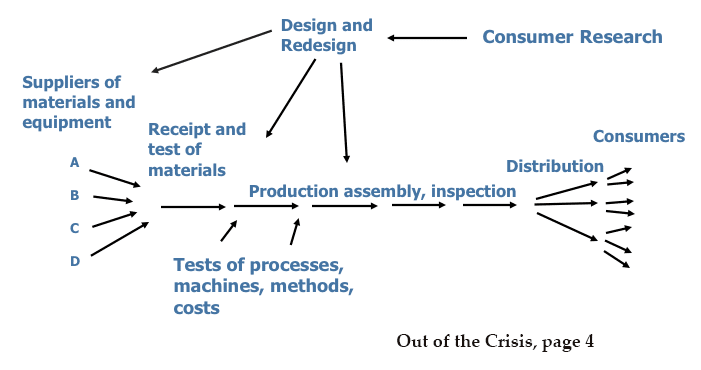By John Hunter, author of Management Matters: Building Enterprise Capability.
The System Of Profound Knowledge® (SoPK) is the culmination of W. Edwards Deming’s work on management. The four areas of the system are: appreciation for a system, knowledge of variation, theory of knowledge and psychology. This post explores appreciation for a system in the context of Dr. Deming’s management philosophy.
Taking a systems approach results in management viewing the organization in terms of many internal and external interrelated connections and interactions, as opposed to discrete and independent departments or processes governed by various chains of command. When all the connections and interactions are working together to accomplish a shared aim, a business can achieve tremendous results—from improving the quality of its products and services, to raising the entire esprit de corps of a company.
A system view of the organization views the flow of the processes to create products and services. The interactions between various processes is respected. This is the image Dr. Deming put on the board each day he was providing an overview of management practices to Japan’s leaders in 1950.

A system view helps create a long term focus. Rather than seeing incidents as isolated (and often looking for the person to blame for a bad result) a system view allows managers to focus on the systemic drivers of results.
For Dr. Deming the purpose of an organization was to create a system that provides benefits to all stakeholders, page 51 of the New Economics:
The aim proposed here for any organization is for everybody to gain – stockholders, employees, suppliers, customers, community, the environment – over the long term.
Dr. Deming continually increased the percentage of problems attributable to the system instead of to special causes (outside of the system) such as blaming a person for a mistake. Obviously that doesn’t mean those problems are inevitable, it just means that the most effective way to improve and avoid those issues in the future is to improve the system.
Out of the Crisis, page 315:
I should estimate that in my experience most troubles and most possibilities for improvement add up to the proportions something like this:
- 94% belongs to the system (responsibility of management)
- 6% special
Related: Systems Thinking and the Three Musketeers by Eric Christiansen


